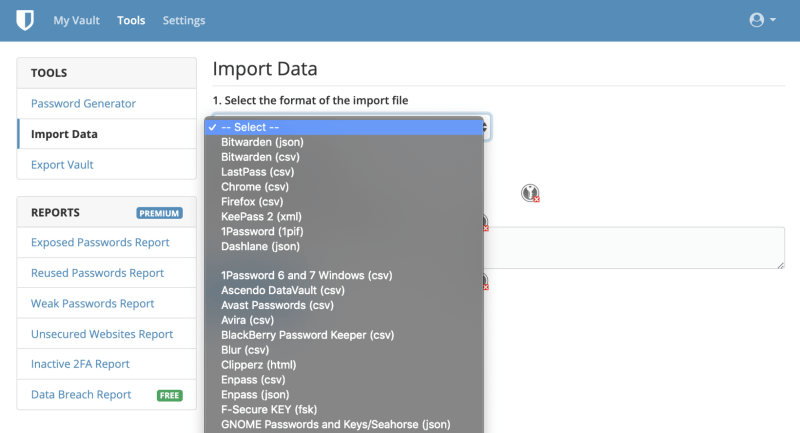- Bitwarden Lastpass 1password
- Lastpass 1password Bitwarden Account
- 1password Lastpass Dashlane Bitwarden
So, here is our compassion between Bitwarden vs LastPass, which of these is the best open source password manager 2021. The winner takes it all (and hides it) in the battle of the password managers.
Password Managers are, we think, generally a good thing. Remembering adsofpjdp is one thing, but also committing 4256p4m2glm! and paLsdKfnk26& to memory is quite another. Keeping your passwords strong and changing them regularly is important these days, when you can check on a website whether or not you’ve been “pwned,” and Chrome harasses you with your unfeasible large number of compromised passwords.
Web browsers, the front line in the war between password and jailbird, have been able to remember your passwords for a while now, and can generate strong passwords that you’ll never be expected to remember. This is fine until you try to log in on a different system, or using your cell phone, and have to dig in the browser settings to view the password that it recorded for you.
Benefits of Password Managers
There’s another benefit of password managers: they tend to come backed with some sort of internet security suite or browser plugin. They also make it easy to manage your passwords, syncing across devices, generating new ones, and hiding everything behind a master password—which is the only one you need to remember. You can also use them to hide encrypted notes, too.
Disadvantages of Password Managers
Of course, the downside of this is that they’re massive targets for password thieves. Once they’ve compromised your master password, your entire digital life is laid open. It’s worth, therefore, making that master password as complex as you can possibly cope with, changing it regularly, and never reusing passwords. There are also services, such as some banks, that don’t support their use, and if you’re caught with your banking details in one you may not get a refund if you’re a victim of cyber crime.
Sep 01, 2020 Here a few scenarios to help guide your choice between 1Password vs LastPass vs Dashlane vs Bitwarden: If you want the best free password manager, you should choose LastPass or Bitwarden. If you want something that’s more than just a password manager, you should choose Dashlane. To get started, head to Bitwarden’s site and create an account. It’s free to do, and all you need to worry about is giving yourself a solid master password.Make it a good one, and one that you. When comparing LastPass vs Bitwarden, the Slant community recommends Bitwarden for most people. In the question “What is the best cross-platform password manager?” Bitwarden is ranked 4th while LastPass is ranked 6th. The most important reason people chose Bitwarden is.
Two of the market leaders in password-management software are LastPass and Bitwarden. Both are available for free, though they maintain premium subscription tiers if you need the additional features they can bring. The free apps, however, contain all the functionality you’ll need as a one-person user, and only become limiting if you want to roll them out across entire organizations.
You can store an unlimited number of passwords in both, and sync them across devices. They both generate random passwords when you sign up for a new service or want to change an existing password, and you can use them to encrypt information, such as bank details or credit card numbers.

Bitwarden VS LastPass

Bitwarden is open source, which means it has faced external scrutiny from security experts, while LastPass is not. This doesn’t mean there’s anything wrong with LastPass’s security, of course—it takes part in security audits—and neither app has reported a full data breach, though LastPass has been the target of some minor ones. LastPass offers a hint for your master password, which can save you if you’ve forgotten it. Bitwarden does not.

Both apps offer plugins for major browsers—Chrome, Edge, Firefox, Opera, and Safari. Bitwarden goes one further and plugs into the, ahem, “privacy-focused” browser Tor, while LastPass works nicely with Internet Explorer. These plugins can be used to auto-fill identity fields within webpages, as well as manage your password database via the web interface.
Feb 17, 2021 While LastPass’ decision is certainly understandable, many users will not be comfortable with such a limited experience. Read more: LastPass Free users will lose access to this critical feature in one month. While there are several free alternatives available, few can compare to the open-source and secure Bitwarden password manager.
Both services also come with desktop apps, although it’s notable that Bitwarden’s doesn’t support two-factor authentication, and doesn’t have the random-password generator or password-sharing abilities of the LastPass app. Both services use separate authenticator apps, however.
Usage
The award for user-friendliness has to go to LastPass, as its app and web interface are virtually identical, meaning you only have to learn how to use it once. Both managers use AES-256—the only public security standard approved by the NSA—against which there is no known practical attack strategy that doesn’t use a side-channel or some additional knowledge of the key.
Settings
Setting the apps up is a simple process. If you’ve got passwords stored somewhere, such as in Chrome, then they will import them for you. LastPass’s Security Challenge feature regularly reminds you to change passwords that are overdue or weak, and there’s an auto-change feature that can rattle through multiple password updates quickly— an extremely popular feature with users.
LastPass also has recovery options if you lose your master password, sending one-time passwords to trusted email addresses. Bitwarden doesn’t offer this—any passwords you store on its servers are accessible to you alone through the master password, so if you lose it or it becomes compromised, then you’ll need to rebuild your entire password database.
The Difference
Bitwarden has one feature you won’t find in many other places: your password vault doesn’t have to be stored on its servers. This is likely to be of more interest to corporate users (it’s only available through the Enterprise subscription tier), but the ability to keep your passwords under your control on your own server can be an attractive feature. Both apps offer secure password-sharing between two users as part of their free tier, which scales up through their Premium and Enterprise tiers, and both offer a small amount of encrypted file storage too, as long as you’re a subscriber.
It’s worth pointing out again that both apps have a free tier, so it’s perfectly possible to download them both, get them set up, and choose which one suits you best with no cost other than a little bit of your time. We’re big fans of Bitwarden, but using either app is still better than using neither and trying to remember all your passwords, which inevitably leads to reused, weak passwords, or other security flaws. Password managers are also more secure and flexible than getting your browser to remember them.
The Cost
Pricing is very close, with LastPass’s tiers being slightly more expensive each month by a buck or so. You may find, though, that you get more for your money with LastPass if you’re going to go for one of the business-oriented tiers.
Either way, a password manager is a valuable addition to your enterprise, and anyone who uses passwords online can benefit from one. These apps are so similar that it will come down to which has a feature you like, or just personal preference as to which one you ultimately choose.
1. Security & Encryption
It’s critical for a password manager to store and transmit information securely, to provide multifactor authentication — or at the very least the option for two-factor authentication — to further impede hacking attempts and to encrypt data in ways that can’t be decrypted even with brute-force cryptanalytic attacks. Modern security practices should also, ideally, include third-party security audits.

2. App Compatibility
We looked for whether each app provides broad-based compatibility with multiple devices, browsers, and operating systems. The best password managers should run as seamlessly as possible on any device, should be able to synchronize data between unlimited numbers of devices and should work with the broadest possible range of mobile, desktop and laptop operating systems as well as the most popular web browsers.
Bitwarden Lastpass 1password
3. Ease of Setup & Use
A high-quality password manager should be painless to set up and intuitive to use. The less time you have to spend working out how the software accomplishes certain tasks, the more time you can spend actively securing your passwords, and time is money for businesses and families alike. An up-to-date password manager should also offer the convenience of biometric logins for your smartphone.
Lastpass 1password Bitwarden Account
4. Password Sharing
There are times when it’s necessary to share passwords between certain users. We looked at the tools each application provides for doing this as securely as possible, the features they provide for controlling this kind of access, the tiers of service at which each of them allows sharing with multiple or unlimited users and any particularly useful aspects of each solution’s approach to password sharing.

5. Pricing
1password Lastpass Dashlane Bitwarden
We looked carefully at what each password manager provides for password storage and other key resources at paid tiers of service, whether they provide a functional free version (and if so, how functional that free version is) and overall value-for-money.
